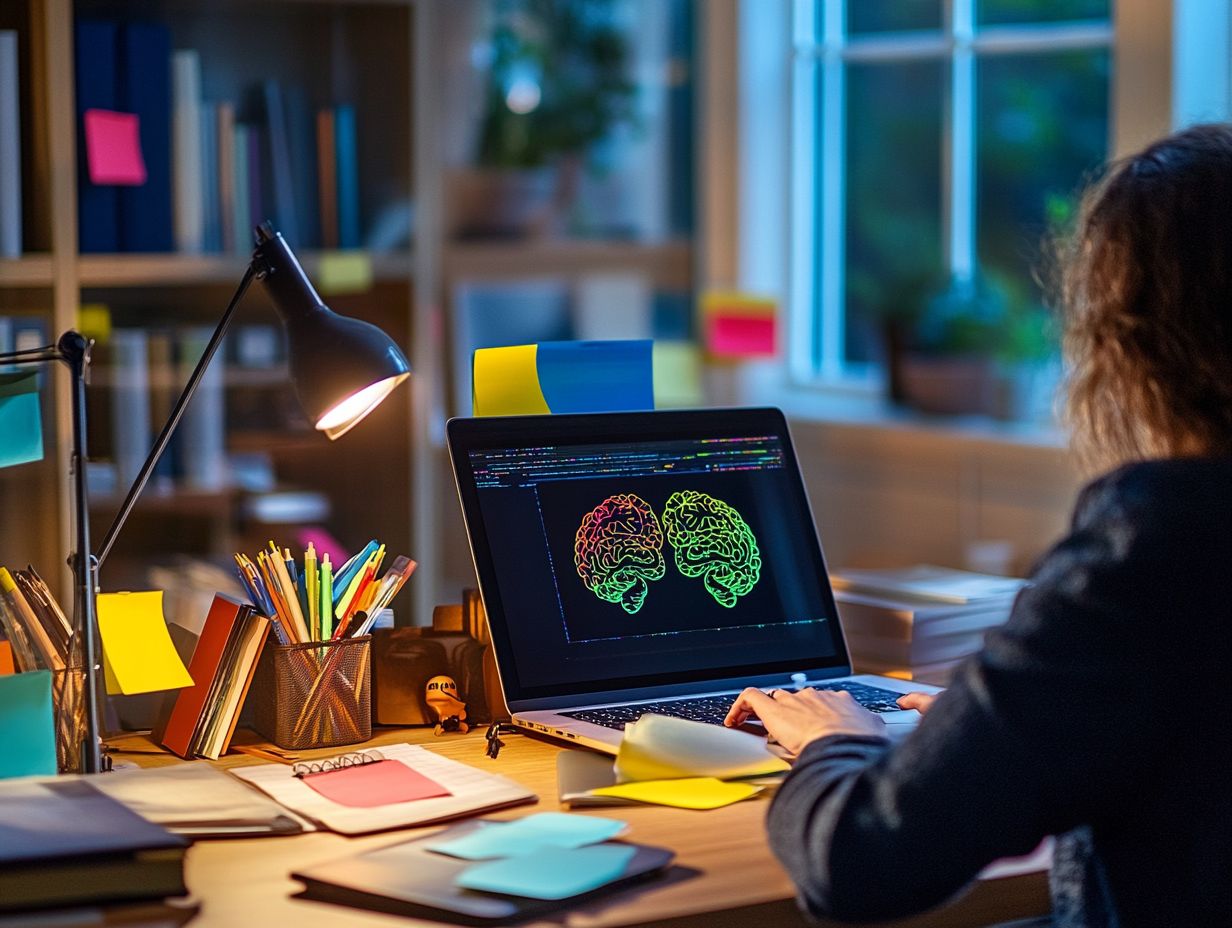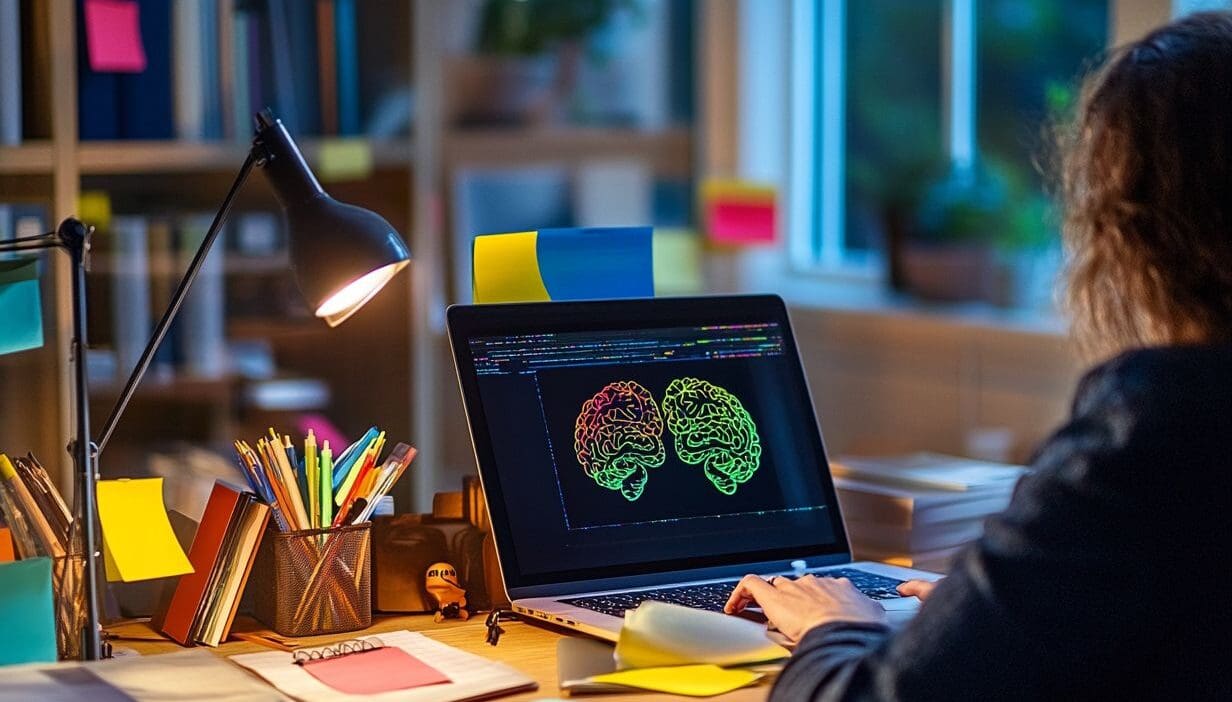The brain is a remarkable organ that plays a pivotal role in our mental performance, influencing various aspects such as cognitive functions and emotional resilience. Incorporating techniques like neuroscience hacks and mindfulness practice can significantly enhance this. This discussion will examine how the brain impacts our mental capabilities and will present neuroscience-based strategies that can enhance performance. It will cover practical techniques, including diaphragmatic breathing and powerful posture, the latest technologies in brain training, optimal nutrition for brain function, and the essential role of sleep. Prepare to explore ways to unlock the full potential of the mind.
Key Takeaways:
Understanding the Brain, Attentional Narrowing, and Mental Performance

A comprehensive understanding of the brain is crucial for enhancing mental performance, as neuroscience provides insights into the interaction between cognitive functions and emotional states, which ultimately influences our capacity to achieve optimal performance across various tasks.
By examining concepts such as attentional narrowing, dopamine release, and the effects of brain chemistry, individuals can gain a deeper understanding of how to harness their mental capabilities for personal growth and increased productivity. Notably, recent research from ResearchGate highlights how narrowed attention can enhance goal-relevant actions.
Furthermore, techniques such as mindfulness practices and visualization can serve to optimize the brain’s potential, equipping individuals to effectively confront challenges, manage stress, and improve task completion rates.
How the Brain, Cognitive Tasks, and Attentional Narrowing Affect Mental Performance
The brain plays a pivotal role in influencing mental performance by regulating cognitive tasks through mechanisms such as attentional narrowing. This phenomenon can enhance focus on specific objectives while potentially restricting broader awareness.
A thorough understanding of this process is essential, as attentional narrowing can yield both benefits and drawbacks depending on the context.
When individuals encounter overwhelming stimuli, the brain’s capacity to concentrate on a singular task often sharpens problem-solving skills and enhances overall productivity. However, this tunnel vision can also result in the oversight of important information and critical insights, particularly in collaborative settings or when multitasking is necessary.
To optimize mental performance, various techniques, including mindfulness practice and deliberate practice, may be employed to expand awareness and improve task completion and task-switching capabilities. This ultimately fosters a more balanced approach to cognitive performance, as detailed in a recent publication by the American Psychological Association.
Neuroscience Hacks and Leadership Strategies for Boosting Mental Performance

Neuroscience strategies provide practical methods for enhancing mental performance by utilizing insights from cognitive science to improve productivity, memory, and overall brain function. According to a detailed analysis from Medium, integrating these insights can significantly elevate transformational leadership.
By fostering a growth mindset and integrating techniques such as memory palace visualization and effective task completion strategies, individuals can enhance their mental agility and achieve high performance and leadership strategies in both personal and professional pursuits.
Practical Techniques, Meditation Techniques, and Strategies
Practical techniques and strategies, including visualization techniques, diaphragmatic breathing, meditation techniques, and mindfulness meditation, can significantly enhance mental performance by reducing stress and improving emotional regulation.
These methods not only assist individuals in achieving a heightened state of focus but also promote an overall sense of well-being.
For example, diaphragmatic breathing is a straightforward yet effective exercise that encourages deep, abdominal breathing, which has been demonstrated to lower cortisol levels and facilitate relaxation. Additionally, visualization techniques enable individuals to mentally rehearse scenarios or goals, thereby enhancing confidence and clarity.
Incorporating mindfulness practices fosters an awareness of the present moment, unlocking the potential for improved decision-making, creative thinking, and problem-solving. By integrating these approaches, individuals are better equipped to navigate daily challenges while enhancing their cognitive abilities and emotional resilience.
Using Technology and Sensory Engagement to Enhance Mental Performance

Technology has created new opportunities for enhancing mental performance through the development of brain training applications, tools, and devices aimed at improving cognitive functions and emotional well-being.
By utilizing these technological advancements, individuals can participate in targeted exercises that enhance mental agility, promote effective stress management, and support personal growth.
Apps, Tools, and Devices for Brain Training and Language Learning
A wide array of applications, tools, and devices for brain training is currently available, offering innovative methods to enhance cognitive functions and improve mental health through structured exercises and challenges.
These digital solutions are specifically designed to engage users in a variety of mental exercises that target key areas such as memory, attention, problem-solving, and spatial reasoning. By incorporating gamification elements, many of these applications achieve both effectiveness and enjoyment in cognitive training.
Regular utilization of these brain training platforms has been demonstrated to lead to significant improvements in cognitive functions, cognitive development, and mental health, contributing positively to overall mental wellness.
For individuals seeking to maintain sharp cognitive abilities, integrating these tools into their daily routines can serve as a crucial strategy for long-term cognitive health.
Incorporating Nutrition and Writing Habits for Optimal Brain Function

Incorporating proper nutrition is essential for optimal brain function, as the foods we consume have a profound impact on mental performance, cognitive functions, and overall brain health.
A balanced diet that includes brain-boosting nutrients can help mitigate cognitive decline and improve emotional well-being, ultimately resulting in enhanced productivity and various health benefits.
Best Foods, Supplements, and Productivity Tips for Mental Performance
Certain foods and supplements are particularly effective in enhancing mental performance and supporting brain function. Items such as fatty fish, nuts, berries, and specific vitamins play crucial roles in cognitive development.
Incorporating these foods into a daily diet can significantly enhance concentration, memory, and overall mental clarity. Fatty fish, which are rich in omega-3 fatty acids, have been linked to improved cognitive function, while nuts, especially walnuts, provide essential antioxidants that promote brain health.
Berries are recognized for their high levels of flavonoids, which have been shown to enhance memory retention. Furthermore, vitamins such as B-complex, vitamin D, and antioxidants like vitamin E contribute to protecting the brain from oxidative stress.
Collectively, these nutritional powerhouses work synergistically to support not only cognitive health but also emotional well-being, making them essential for individuals seeking to optimize their mental capabilities.
The Role of Sleep and Environmental Needs in Mental Performance
Sleep is of paramount importance for mental performance, as sufficient rest is essential for the maintenance of cognitive functions, regulation of emotional states, and enhancement of productivity.
Substandard sleep quality can result in cognitive decline and heightened stress levels, thereby underscoring the necessity of prioritizing good sleep hygiene to achieve optimal mental health.
Optimizing Sleep and Environmental Conditions for Better Brain Function
Optimizing sleep through effective sleep hygiene practices can significantly enhance brain function and improve cognitive performance, leading to better mental performance and stress management.
By establishing consistent sleep schedules, creating a tranquil sleeping environment, limiting exposure to blue light and screens before bedtime, individuals can cultivate a restful night’s sleep.
This commitment to quality sleep not only facilitates memory retention, effective stress management, and problem-solving abilities but also plays a vital role in emotional regulation.
When the mind is well-rested, it is better prepared to handle stressors, resulting in increased resilience and overall mental stability.
Incorporating relaxation techniques and maintaining a balanced diet can further complement these practices, thereby enhancing cognitive performance and promoting mental well-being.
Consequently, prioritizing sleep hygiene and tai chi practice is essential for achieving optimal brain function and developing effective coping mechanisms necessary for navigating daily life.



